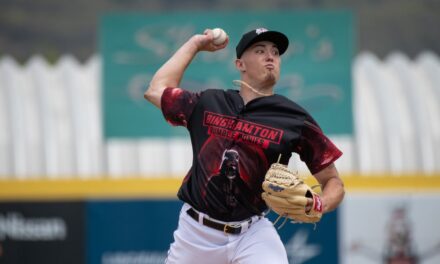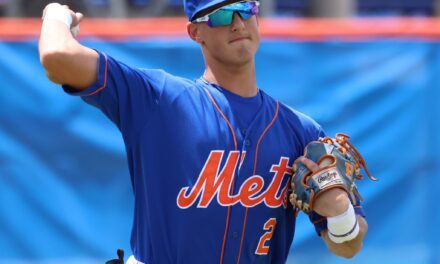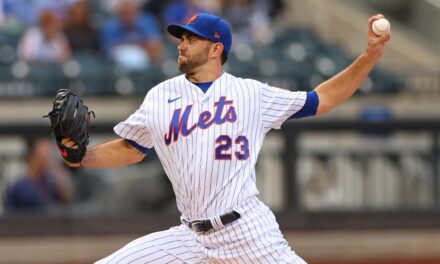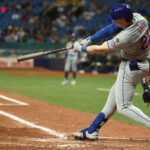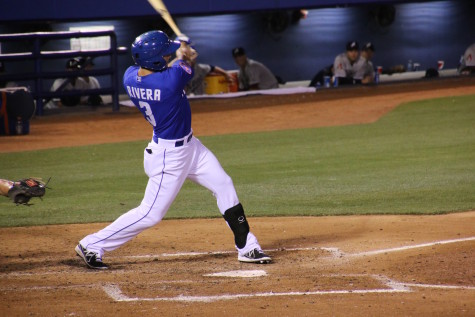
When his baseball playing days are behind him, T.J. Rivera wants to be remembered as a grinder, a guy who didn’t simply go through the motions but played with 100 percent effort every time he stepped on a baseball diamond.
“That’s something I’ve always tried to live up to, going out there and playing hard every pitch,” Rivera stated in his final response during an interview I conducted with him on our WIOX, Tip-Off Sports radio hour.
You won’t get an argument about Rivera’s work ethic from Binghamton Met baseball fans who have watched the popular B-Met play three of the four infield positions during parts of the past two baseball seasons. Going into the final weekend of the regular season, Rivera leads the B-Mets in batting with a sparkling .350 batting average.
Amazingly, Rivera’s lofty BA is actually 8 points lower than his team high mark in the batter’s box in 2014. Over two seasons, in 415 B-Met at-bats, Rivera has 147 hits. That’s a combined two year Double-A batting average of .354.
And, in nearly 200 at-bats for Triple-A Las Vegas this summer Rivera was slashing at the plate. On July 18th, Rivera went 3-for-5 against Albuquerque raising his batting average to .327. A mini slump, 3-23, in the 8 games before his recall to Binghamton, dropped his Triple-A hitting stats to .306.
Putting it simply, T.J. Rivera can hit. With numbers echoing the batting line outlined above on every rung of the Met’s minor league ladder, it’s not surprising Rivera takes a bit of swagger into the batting box. I asked T.J. about his batting approach.
“It really depends on the situation,” he began. “With a guy on third base, you’re trying to do something different to what you’d do with no one on. You’re also just trying to hit the ball hard.”
Rivera went on to say that in every at bat he’s trying to compete with the pitcher. “Early in the count, I’m just trying to find a good fastball in the middle of the zone, something I can drive and something I can really put a good swing on and hopefully hit the ball in a gap somewhere.”
“With a strike or two strikes my approach will change a little bit. My swing doesn’t change but my approach does. With two strikes, I’m going to let the ball get a little deeper. The pitcher’s got a different approach, too, he’s trying to extend the zone a little. So, I have to change my approach and work a little harder to compete.”
“I don’t want to just put the ball in play with two strikes, I want to put it in play hard and make something happen. Obviously, everything changes with guys on base.”
Since T.J, has played at every level in the Mets minor league system, I asked him if there is a specific batting approach or philosophy emphasized in the Met farm system all the way up the minor league chain.
“I wouldn’t say anything too crazy that other teams are not doing. They do like us working the count. They like us to swing at pitches in the zone, and I think any club would probably think the same thing, because you don’t want to help the pitcher out.”
“They’re trying to teach us to find the pitch we like to hit and where in the zone we like to hit the ball best. Then try to hit that pitch and that pitch only until you get two strikes. You don’t want to swing at the pitch the pitcher wants you to. That ends up in a weak ground ball that you’re not looking to do.”
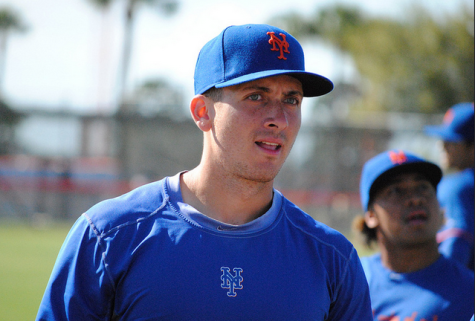
Hitting the way he has year after year, apparently, T.J. Rivera is an attentive student. I asked him too about the difference in the pitching he has experienced as he climbed the Met minor league ladder.
“As you move up to Double-A and Triple-A you’re not going to get as many hitter’s counts where you can get the pitch you’re looking for, So, selective hitting plays a bigger role, because now if I don’t get the pitch I’m looking for and I swing at a pitch too low, I’m not going to do what I want at the plate.”
As Rivera sees it, stronger bullpens at the upper minor league levels also add to the batting challenge. “The bullpens get a lot better, too. It’s like every team has a lot of hard throwers and good arms in the bullpen. Other than that, pitchers at the upper level know how to pitch, so as you get older, you have to get smarter.”
Rivera said that the Marlins’ Jose Fernandez is one of the toughest pitchers he has faced so far in the minors. “You kind of knew he was going to be special.” Ironically, although he has faced some outstanding minor league prospects, it’s many times those crafty pitchers that change speeds in different ways that give him the most trouble.
As far as strong pitchers go, Rivera likes the guys in the Mets system most. “The guys on my teams, they’re the ones who impress me more than anybody, a guy like Steven Matz. I had to face him in spring training and that’s not fun. Noah Syndergaard, I had to face him, too.”
“Guys like that are overpowering. They throw the kind of stuff you’re expecting to see in the ninth inning from a closer, but they’re throwing it for 6 or 7 innings.”
T.J talked about the subtle differences in playing the various infield positions. At shortstop he said he has to remember to move his feet, to get to the ball with his feet because his throw from short is the longest you will make in the infield. Manning third base is about reflexes and handling the hot stuff and knowing the speedsters most likely to place a bunt perfectly down the line. He finds second base a bit easier because of the added time, but coming across the bag and throwing across your body with a sliding runner coming at you makes the turn on a double play an added challenge.
I mentioned that the middle infield slots seems to be the strongest position spots in the Met farm system and asked T.J. to talk briefly about some of his teammates who have played there. Here’s what he said.
Matt Reynolds – Consistent defensive play. He has a nice swing, but he really impresses me defensively at short.
Dilson Herrera – He’s an animal. That kid is a little ball of fire. He’s kind of like Darrell Cecilaini in that he ignites a team because he plays so hard. Sometimes you see a top prospect who kind of goes through the motions. He’s not like that. You’d never think he’s a top prospect because of the way he plays. You’ve got to love the way he goes about his business.
Wilfredo Tovar – Great hands. Smooth defensively. He’ll do some things with his glove that kind of wow you on the field and you’ll think – did that just happen? Great hands.
Daniel Muno – Nothing phases him. He’s the type of guy you can put in a tough situation because nothing phases him.
Gavin Cecchini – He’s impressed me with his stick, and he goes about his business the right way. He plays the game pretty well, pretty hard, and he’s impressed me this year a lot.
L.J. Mazzilli – He’s my roomie, a grinder on the baseball diamond. He knows how to play the game. He hits the ball consistently, and he’s got a really good swing. He hits the ball hard all over the place. He knows how to hit the ball hard to right-center field. That’s impressive.
Met fans always mention that Rivera went undrafted. T.J. told me the Mets called about a week after the draft to discuss his signing on. His humble introduction to professional baseball is a motivator. “There’s a lot that motivates me. For guys that went undrafted, it would be nice to show, we can play the game, too, and to never give up hope.”
Chatting with T.J. on the air and briefly following him this week at NYSEG Stadium, I can only hope he gets a shot and gets a chance at the big leagues. He’s earned it.
“If this kid ever gets a look in the majors, I know he’s going to hit,” said B-Mets GM Jim Weed, who has watched a lot of prospects over the years at Binghamton and the rest of the Eastern League. My sentiments exactly.


